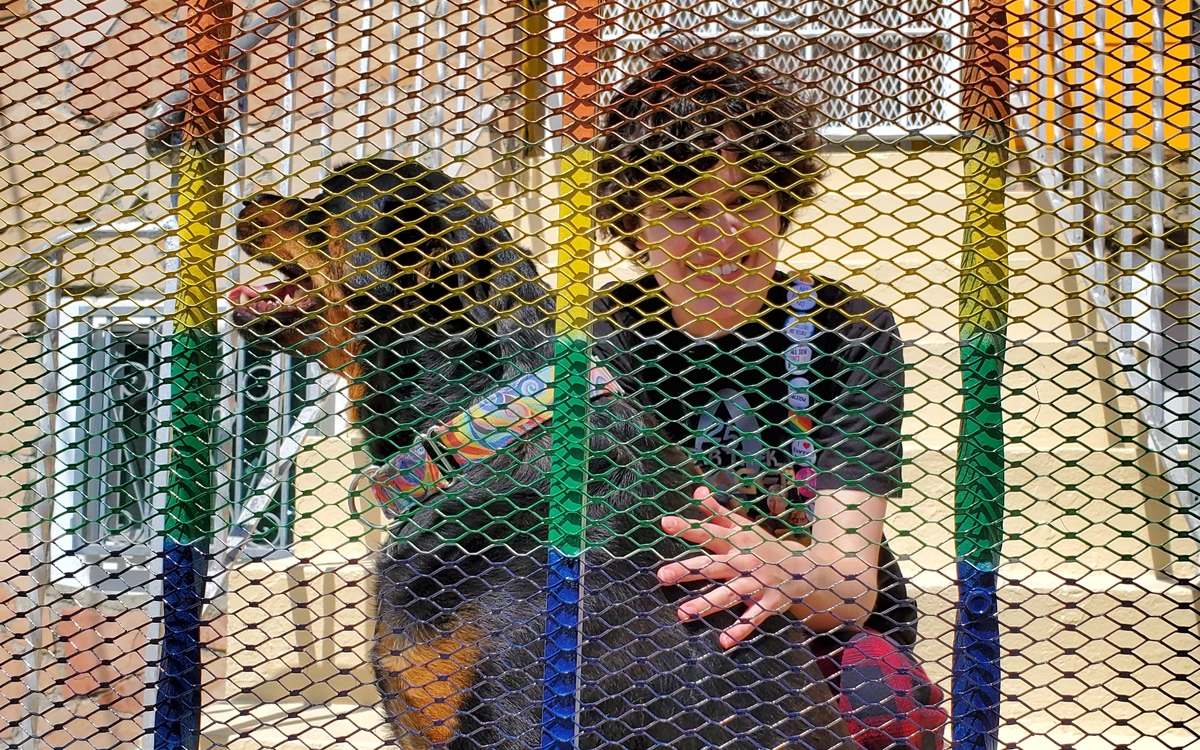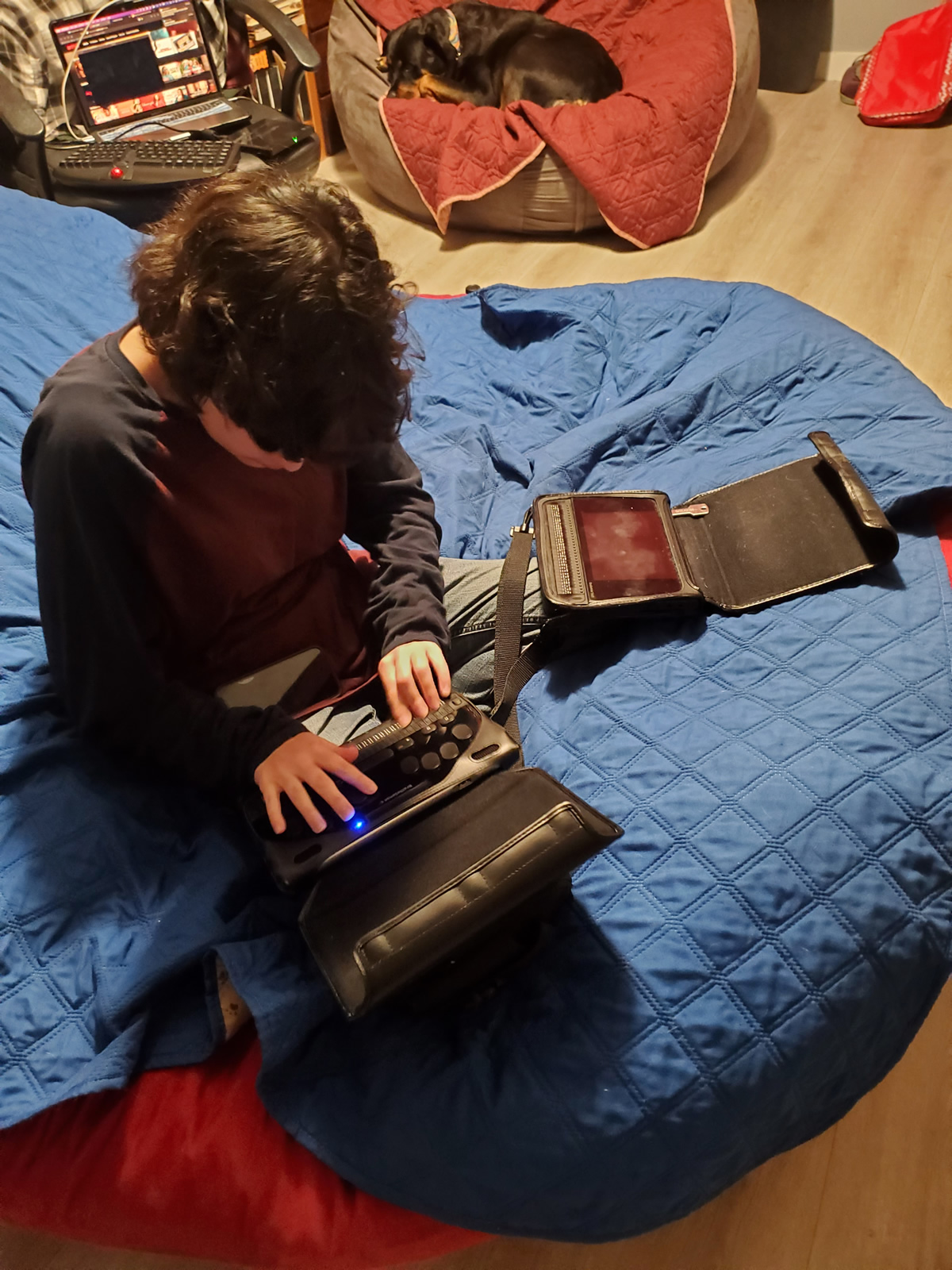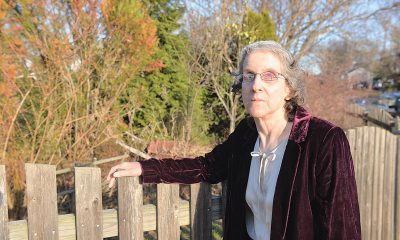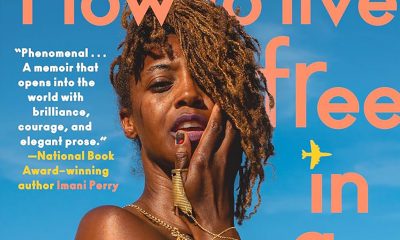Arts & Entertainment
Queer, Crip and Here: Meet blind writer Caitlin Hernandez
Author navigates intersecting identities in life, work

(Editor’s Note: One in four people in America has a disability, according to the Centers for Disease Control and Prevention. Queer and disabled people have long been a vital part of the LGBTQ+ community. Take two of the many queer history icons who were disabled: Michelangelo is believed to have been autistic. Marsha P. Johnson, who played a heroic role in the Stonewall Uprising, had physical and psychiatric disabilities. Today, Deaf/Blind fantasy writer Elsa Sjunneson; actor and bilateral amputee Eric Graise who played Marvin in the “Queer as Folk” reboot; and Kathy Martinez, a blind, Latinx lesbian, Assistant Secretary of Labor for Disability Employment Policy for the Obama administration, are only a few of the queer and disabled people in the LGBTQ community. Yet, the stories of this vital segment of the queer community have rarely been told. In its monthly, yearlong series, “Queer, Crip and Here,” the Blade will tell some of these un-heard stories.)
Some creators agonize for years before plunging into their art.
This wasn’t the case with queer, blind writer and teacher Caitlin Hernandez. Hernandez wrote her first “novel,” “Computer Whiz,” she writes in her bio, when she was in the fourth grade. She kept her monitor off so no one would see her “masterpiece.”
Reading and writing have been a part of Hernandez’s life for as long as she can remember. “I was writing, even as a little kid,” Hernandez, who was born in 1990 and grew up in Danville, Calif., said in a telephone interview with the Blade, “In first grade, I wrote stories in braille. They taught me to type. Because people were having to translate.”
As a kid, Hernandez used a tape recorder to tell stories. “That happens so often with blind kids,” said Hernandez, who lives in San Francisco with her partner Martha and Maite their Rottweiler.
Maite was Martha’s dog when the couple got together. “I call her my ‘stepdogter,’” Hernandez said. It’s clear from the get-go that she doesn’t take herself too seriously. Maite, her “stepdogter,” is “currently writing a picture book,” Hernandez jokes in her bio.
It’s commonly thought that disabled people lead sad, tragic lives. But Hernandez busts this myth. Martha, her partner, “reads braille with her eyes,” Hernandez whimsically writes in her bio.
Hernandez is committed to teaching and writing. But, she “loves eating coffee ice cream, watching Star Trek Voyager, singing, skipping and using her rainbow cane – sometimes all at once,” Hernandez writes in her bio.
Queerness is an integral part of Hernandez’s life: from her fiction, which tells stories of LGBTQ people, disabled people, and people of color to her rainbow cane.
“Queerness is considered cool now in many places,” Hernandez said, “it’s normalized.”
But that’s not true with disability, she added. “Generally, there’s more fear and misperceptions around disabled people,” Hernandez said.
Because of their discomfort with disabled people, she’s often left alone at social and literary gatherings.
“Because I’m blind, people frequently won’t talk to me,” Hernandez said, “even if I’ve read at an open mic.”
To make people feel more comfortable with her, Hernandez, totally blind since birth, sometimes uses a rainbow cane. “I designed it,” she said, “it has the colors of the rainbow flag. If you’re queer, you’ll get that.”
But it’s also beautiful because it’s a rainbow, Hernandez said, “It’s a great ice-breaker.”
(Hernandez uses her rainbow cane when she’s out with friends. When traveling by herself, she uses the white cane used by most blind people.)
Once people get to know [disabled people],” Hernandez said, “they’re chill with us.”
The Americans with Disabilities Act of 1990 (ADA), a landmark civil rights law, despite problems of enforcement and compliance, has done much to change life for disabled people.
The ADA generation (those born when or after the law was passed) has grown up with the expectation that disabled people have rights. They’re not surprised to see curb cuts or braille menus. They expect employers to make accommodations for disabled employees and hospitals to have sign language interpreters for Deaf people.
Yet despite the ADA, ableism persists (even within her own ADA generation), Hernandez said. A key reason why discomfort with and fear of disabled people is still so pervasive is the problem of representation, she said.
Hernandez, a Lambda Literary Emerging Writer Fellow in 2015 and 2018, is acutely aware of how disabled and queer and disabled people are portrayed in fiction and nonfiction.
“Our lives are often represented so badly,” Hernandez said, “often by nondisabled creators. There’s a lot of fear and inaccuracy.”
Thankfully, there are a few fab books with disabled characters by disabled authors, Hernandez said. She loves “The Kiss Quotient” by Helen Hoang, who is autistic. The novel portrays the romance of an autistic econometrician and her biracial male escort.
Hernandez is a fan of “The Silence Between us,” a young adult romance featuring a Deaf character, by hard-of-hearing author Alison Gervais.
“The Chance to Fly,” co-authored by Ali Stroker, the bisexual, Tony-winning actress who uses a wheelchair, and Stacy Davidowitz, is one of Hernandez’s faves. The book, a novel for middle-schoolers, tells the story of a theater-loving, wheelchair using girl, who defies ableist expectations.
Hernandez began to think she was queer when she was in high school. But, she didn’t come out then to anyone except a few of her friends. “They kinda didn’t believe me,” Hernandez said, “because a friend of ours had already come out as queer and they thought I was trying to copy him.”
After she was in college, Hernandez, who earned a bachelor’s degree in literature from the University of California, Santa Cruz in 2012, came out to her parents.
Her folks, now divorced, were fine with her being queer.
Because nondisabled people frequently don’t see disabled people as datable or sexy, some aspects of coming out are more difficult if you have a disability, Hernandez said. “We often miss one of the rites of passage of coming out,” she said, “of saying ‘I am queer – here with my queer date (or partner).’”
Hernandez’s first relationship was with a woman who was closeted. “We couldn’t be out,” she said.
Hernandez got together with her partner Martha in November 2019. Then there was the pandemic and everything was cancelled. “So we didn’t get to go out as an out queer couple,” Hernandez said.
“Everybody knows I’m partnered with Martha,” she added.
But because of ableism, sometimes people don’t see her as Martha’s romantic partner, Hernandez said.
Like many, Hernandez navigates intersecting identities. “I’m thinking more about my being of mixed race,” Hernandez said, “My Mom is white. My Dad is one-half Mexican and one-half German. I can pass as white,” she added.
She’s grappling with what it means to have a Latinx last name, Hernandez said.
She wishes she had taken Spanish. “But I took French,” Hernandez said, “I wanted to do what my friends were doing.”
As a writer, Hernandez hopes to help children who live with intersecting identities.
Her work has appeared in “Aromatica Poetica,” “Wordgathering” and in “Barriers and Belonging,” “Firsts: Coming Of Age Stories by People with Disabilities” and other anthologies.
In 2013, “Dreaming in Color,” a musical written by Hernandez, was produced by CRE Outreach at the Promenade Playhouse in Santa Monica, Calif.
Hernandez’s unpublished young adult novel “Even Touch Has a Tune” is about a queer, blind girl falling in love with another girl and surviving sexual assault, Hernandez said in an email to the Blade. “It’s fiction but has a lot of autobiographical content,” she added.
If you’re disabled, you’re more vulnerable to sexual assault. When she was a freshman, Hernandez became friends with a fully sighted guy who she’d met in her classes. “He seemed nice,” she said, “but then he came over and touched me inappropriately.”
“I froze up,” Hernandez added, “if you’re disabled, you’re vulnerable. You’re taught to be polite – to keep quiet.”
While there’s more representation of disabled people in fiction, Hernandez is still discouraged.
Because of ableism, many literary agents may not want her “disabled and assault novel,” Hernandez said. (Her unpublished YA novel “Even Touch Has a Tune” is represented by Emily Keyes of Keyes Agency.)
Too frequently, representation of disabled people is focused on ableist tropes like “inspiration porn” and “overcoming,” Hernandez said. There isn’t interest in portraying scary, difficult aspects (like sexual assaults) of disabled people’s lives, she added.
But discouragement doesn’t stop Hernandez from writing or from connecting with kids as a teacher.
Hernandez earned a master’s degree in special education and her teaching credentials from San Francisco State University in 2016. Today, she is a resource specialist with the San Francisco Unified School District.
Hernandez enjoys forging a connection with disabled and nondisabled students. “Nondisabled kids come to me for extra help,” she said.
Hernandez has accomplished much. But, “I’ve learned I don’t have to be a role model,” she said, “I don’t have to be perfect.”

Photos
PHOTOS: Montgomery County Pride in the Plaza
LGBTQ celebration held in downtown Silver Spring

Montgomery County Pride in the Plaza was held on Sunday, June 29 at Veterans Plaza in Silver Spring, Md.
(Washington Blade photos by Michael Key)























The fifth annual Fredericksburg Pride march and festival was held on Saturday, June 28. A march through the streets of downtown Fredericksburg, Va. was followed by a festival at Riverfront Park.
(Washington Blade photos by Michael Key)



















India
Anaya Bangar challenges ban on trans women in female cricket teams
Former Indian cricketer Sanjay Bangar’s daughter has received support

Anaya Bangar, the daughter of former Indian cricketer Sanjay Bangar, has partnered with the Manchester Metropolitan University Institute of Sport in the U.K. to assess her physiological profile following her gender-affirming surgery and undergoing hormone replacement therapy.
From January to March 2025, the 23-year-old underwent an eight-week research project that measured her glucose levels, oxygen uptake, muscle mass, strength, and endurance after extensive training.
The results, shared via Instagram, revealed her metrics align with those of cisgender female athletes, positioning her as eligible for women’s cricket under current scientific standards. Bangar’s findings challenge the International Cricket Council’s 2023 ban on transgender athletes in women’s cricket, prompting her to call for a science-based dialogue with the Board of Control for Cricket in India and the ICC to reform policies for transgender inclusion.
“I am talking with scientific evidence in my hand,” Bangar said in an interview posted to her Instagram page. “So, I hope, this makes an impact and I will be hoping to BCCI and ICC talking with me and discussing this further.”
On Nov. 21, 2023, the ICC enacted a controversial policy barring trans women from international women’s cricket. Finalized after a board meeting in Ahmedabad, India, the regulation prohibits any trans player who has experienced male puberty from competing, irrespective of gender-affirming surgery or hormone therapy. Developed through a 9-month consultation led by the ICC’s Medical Advisory Committee, the rule aims to safeguard the “integrity, safety, and fairness” of women’s cricket but has drawn criticism for excluding athletes like Canada’s Danielle McGahey, the first trans woman to play internationally. The policy, which allows domestic boards to set their own rules, is slated for review by November 2025.
Bangar shared a document on social media verifying her participation in a physiological study at the Manchester Metropolitan University Institute of Sport, conducted from Jan. 20 to March 3, 2025, focused on cricket performance. The report confirmed that her vital metrics — including haemoglobin, blood glucose, peak power, and mean power — aligned with those of cisgender female athletes. Initially, her fasting blood glucose measured 6.1 mmol/L, slightly above the typical non-diabetic range of 4.0–5.9 mmol/L, but subsequent tests showed it normalized, reinforcing the study’s findings that her physical profile meets female athletic standards.
“I am submitting this to the BCCI and ICC, with full transparency and hope,” said Bangar. “My only intention is to start a conversation based on facts not fear. To build space, not divide it.”
In a letter to the BCCI and the ICC, Bangar emphasized her test results from the Manchester Metropolitan University study. She explained that the research aimed to assess how hormone therapy had influenced her strength, stamina, haemoglobin, glucose levels, and overall performance, benchmarked directly against cisgender female athletic standards.
Bangar’s letter to the BCCI and the ICC clarified the Manchester study was not intended as a political statement but as a catalyst for a science-driven dialogue on fairness and inclusion in cricket. She emphasized the importance of prioritizing empirical data over assumptions to shape equitable policies for trans athletes in the sport.
Bangar urged the BCCI, the world’s most influential cricket authority, to initiate a formal dialogue on trans women’s inclusion in women’s cricket, rooted in medical science, performance metrics, and ethical fairness. She called for the exploration of eligibility pathways based on sport-specific criteria, such as haemoglobin thresholds, testosterone suppression timelines, and standardized performance testing. Additionally, she advocated for collaboration with experts, athletes, and legal advisors to develop policies that balance inclusivity with competitive integrity.
“I am releasing my report and story publicly not for sympathy, but for truth. Because inclusion does not mean ignoring fairness, it means measuring it, transparently and responsibly,” said Bangar in a letter to the BCCI. “I would deeply appreciate the opportunity to meet with you or a representative of the BCCI or ICC to present my findings, discuss possible policy pathways, and work towards a future where every athlete is evaluated based on real data, not outdated perceptions.”
Before her transition, Bangar competed for Islam Gymkhana in Mumbai and Hinckley Cricket Club in the U.K., showcasing her talent in domestic cricket circuits. Her father, Sanjay Bangar, was a dependable all-rounder for the Indian national cricket team from 2001 to 2004, playing 12 test matches and 15 One Day Internationals. He later served as a batting coach for the Indian team from 2014 to 2019, contributing to its strategic development.
Cricket in India is a cultural phenomenon, commanding a fanbase of more than 1 billion, with more than 80 percent of global cricket viewership originating from the country.
The International Cricket Council, the sport’s governing body, oversees 12 full member nations and more than 90 associate members, with the U.S. recently gaining associate member status in 2019 and co-hosting the 2024 ICC Men’s T20 World Cup. The BCCI generated approximately $2.25 billion in revenue in the 2023–24 financial year, primarily from the Indian Premier League, bilateral series, and ICC revenue sharing. The ICC earns over $3 billion from media rights in India alone for the 2024–27 cycle, contributing nearly 90 percent of its global media rights revenue, with the BCCI receiving 38.5 percent of the ICC’s annual earnings, approximately $231 million per year.
Women’s cricket in India enjoys a growing fanbase, with over 300 million viewers for the Women’s Premier League in 2024, making it a significant driver of the sport’s global popularity. The International Cricket Council oversees women’s cricket in 12 full member nations and over 90 associate members, with the U.S. fielding a women’s team since gaining associate status in 2019 and competing in ICC events like the 2024 Women’s T20 World Cup qualifiers. The BCCI invests heavily in women’s cricket, allocating approximately $60 million annually to the WPL and domestic programs in 2024–25, while contributing to the ICC’s $20 million budget for women’s cricket development globally. India’s media market for women’s cricket, including WPL broadcasting rights, generated $120 million in 2024, accounting for over 50 percent of the ICC’s women’s cricket media revenue.
“As a woman, I feel when someone says that they are women, then they are, be trans or cis. A trans woman is definitely the same as a cis woman emotionally and in vitals, and specially, when someone is on hormone replacement therapy. Stopping Anaya Bangar from playing is discrimination and violation of her rights. It is really sad and painful that every transwoman need to fight and prove their identity everywhere,” said Indrani Chakraborty, an LGBTQ rights activist and a mother of a trans woman. “If ICC and BCCI is stopping her from playing for being transgender, then I will say this to be their lack of awareness and of course the social mindsets which deny acceptance.”
Chakraborty told the Blade that Bangar is an asset, no matter what. She said that the women’s cricket team will only benefit by participation, but the discriminating policies are the hindrance.
“Actually the transgender community face such discrimination in every sphere. In spite of being potent, they face rejection. This is highly inhuman. These attitudes is regressive and will never let to prosper. Are we really in 2025?,” said Chakraborty. “We, our mindset and the society are the issues. We, as a whole, need to get aware and have to come together for getting justice for Anaya. If today, we remain silent, the entire community will be oppressed. Proper knowledge of gender issues need to be understood.”
The BCCI and the International Cricket Council have not responded to the Blade’s repeated requests for comment.
-

 U.S. Supreme Court4 days ago
U.S. Supreme Court4 days agoSupreme Court upholds ACA rule that makes PrEP, other preventative care free
-

 U.S. Supreme Court4 days ago
U.S. Supreme Court4 days agoSupreme Court rules parents must have option to opt children out of LGBTQ-specific lessons
-

 Television5 days ago
Television5 days ago‘White Lotus,’ ‘Severance,’ ‘Andor’ lead Dorian TV Awards noms
-

 Music & Concerts5 days ago
Music & Concerts5 days agoBerkshire Choral to commemorate Matthew Shepard’s life












